General Khalifa Haftar started his long march toward power in May 2014. Under “Operation Dignity,” Haftar started a major fight against Islamists and militias in Benghazi and elsewhere in Libya’s east. In March 2015, the House of Representatives in Tobruk appointed Haftar commander in chief of the Libyan National Army (LNA), a cluster of different militias. The LNA includes Islamists such as the Madkhalis, a fundamentalist group that supported Moammar Gadhafi and fought hard against ISIS in Libya. The LNA’s battle, under the guide of Haftar, to take Benghazi in 2014—as well as Derna, a city 155 miles to the east, in 2018—was slow.
In the meantime, Haftar also marched toward the Oil Crescent, the Libyan energy hub near the city of Sirte, to seize it from the Petroleum Facilities Guard of Ibrahim Jadhran. For this, Haftar earned the title of Field Marshal. And earlier this month, after a long march through southwestern Libya—a region known as Fezzan—Haftar made the bold decision to march on the capital city of Tripoli.
Over the last several years—in the name of an anti-terrorism fight and endless battles to control terrain—Haftar has won the support of the United Arab Emirates, Egypt, Russia, France, and Saudi Arabia. This, in spite of the fact that these countries also claim to support a strong role for the United Nations Support Mission in Libya and its special envoys, which back Haftar’s opposition: Tripoli’s Government of National Accord, led by Fayez al-Serraj.
They have sent Haftar advisors, funds, and weapons. The United States, meanwhile, has kept its distance from the Libya file since the murder of its ambassador in Benghazi in September 2012. Instead, Washington’s interest has largely been limited to a sporadic fight against terrorist groups in the Maghreb and the Sahel. That approach is clearly a tactical one, but does not amount to a strategy.
Haftar’s bold move
Under Italian colonization, the Royal Army in Libya was divided in two contingents, with two different commanders. This helped control logistics in such a hostile environment: Long distances, lack of infrastructure, a desert of shifting dunes, and unbearable temperatures made it enormously difficult to move supplies, which affected every decision of the professionalized Italian military.
Haftar, in contrast, took a rag-tag army comprised of barely-trained militias across the vast Fezzan. He dangerously stretched the contingent in doing so. The soldiers captured in the first week of the siege on Tripoli are very young and clearly not up to the task. Moreover, hundreds of young dead Cyrenaicans (from the east) have now been buried in Tripolitania (in the west), creating a huge problem in the eastern city of Benghazi, where families cannot get back the bodies of their children. At this point, it’s clear that Haftar has only two choices: winning the battle for Tripoli or leaving Libya forever. No one in Benghazi would ever accept him as a loser.
That’s why the fight in the capital looks to be long and bloody, unless the militias that govern Tripoli manage to subdue the strongly hated Haftar. Civilians, caught in the crossfire, see this as an attack on them and an offense to the city’s honor; the militias defending Tripoli see the attack as a huge risk for their territory and their freedom of movement. Accepting Haftar would mean losing all that.
The wrong man for Libya
Thousands of years ago, the great Chinese General Sun Tzu wrote that the best general is the one who wins the war without fighting. Haftar should have taken inspiration from him. He should have known that, in spite of all their frictions, Libyans are able to unify in the face of a common enemy, and that is exactly what Tripoli’s militias—usually busy warring with each other—did in recent weeks.
And even though the field marshal should be able to win the war thanks to his external allies, it’s hard to predict what exactly will happen. Regardless, Tripoli will remain a chaotic place. Ongoing chaos provides fertile ground for resistance groups, including terrorist groups like the Islamic State and al-Qaida in the Islamic Maghreb.
Libyans do not deserve more bloodshed or another military regime. That’s why Haftar is the wrong man for Libya. His attack on Tripoli spoiled the chance to hold a U.N.-backed National Conference in the city of Ghadames in mid-April, which should have been a crucial moment for unity.
Haftar, had he been wiser, could have gathered his army but allowed the conference to proceed in peace—at that point, he could claim to have helped the peace process and position himself as the only Libyan leader able to guarantee progress. Instead, he chose a path of violence, which never pays back—violence hits, first of all, the civilians.
The role for the United States
Before tweeting something rash, President Trump should think seriously about the productive role the United States might play. As I have argued before, the U.S. role could be still determinant in reversing Libya’s awful downward spiral. The United States could have an important diplomatic function on two fronts: To coordinate and balance the different external actors, and to help mediate between the main internal actors, namely the Tripoli-based Government of National Accord and the Tabrouk-based House of Representatives.
Washington should take a clear, firm position on Libya that acknowledges U.N. resolutions that the United States has supported in the past. It should also push for a withdrawal of Haftar’s army from Tripoli and for a common voice—among the key external players—on Libya.
In practical terms, the United States should leverage the preferential relations it has with Egypt and Saudi Arabia, making sure that no more material support goes to Haftar’s army. Without that support, Haftar would remain mired outside the gates of Tripoli. If Egypt and Saudi Arabia were to step back, the UAE would do so as well, and the chain of support for Haftar would break.
As for Western diplomacy, more resolute U.S. action would block any dangerous French ambitions linked to the energy sector, in particular. Secretary of State Mike Pompeo should work to improve relations between France and Italy regarding Libya, a problematic split in what has become a deeply divided Europe.
Finally, a simple military gesture—such as the placement of an American warship outside the port of Tripoli—would send a clear message to Haftar and could encourage him to retreat from any further violence on the capital.
The Brookings Institution is committed to quality, independence, and impact.
We are supported by a diverse array of funders. In line with our values and policies, each Brookings publication represents the sole views of its author(s).

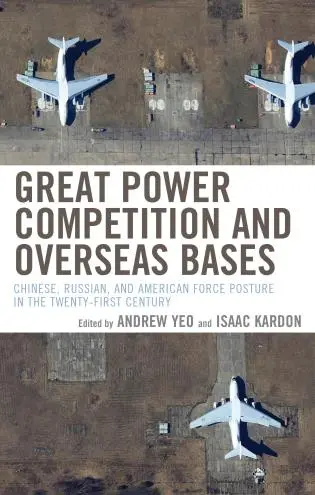

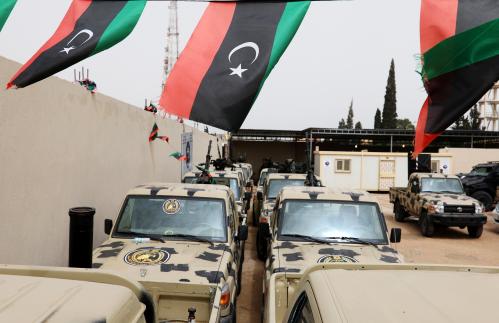
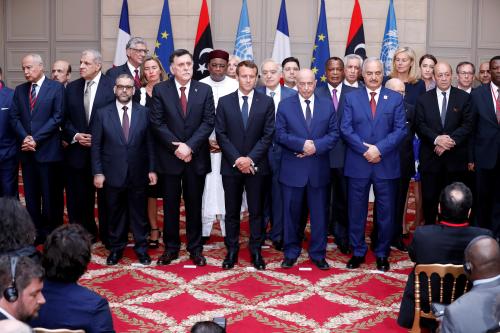

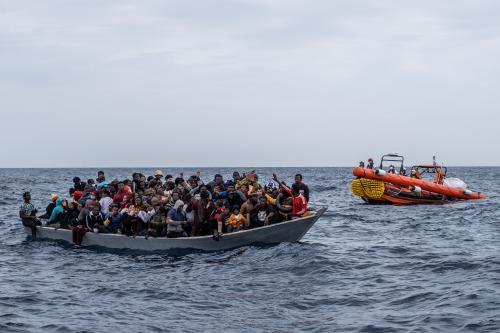
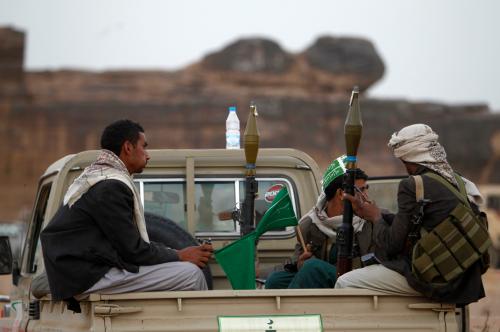
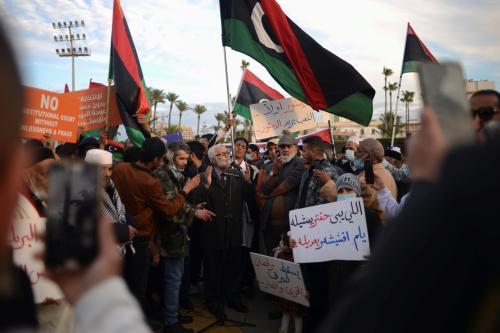
Commentary
With Haftar attacking Tripoli, the US needs to re-engage on Libya
April 25, 2019